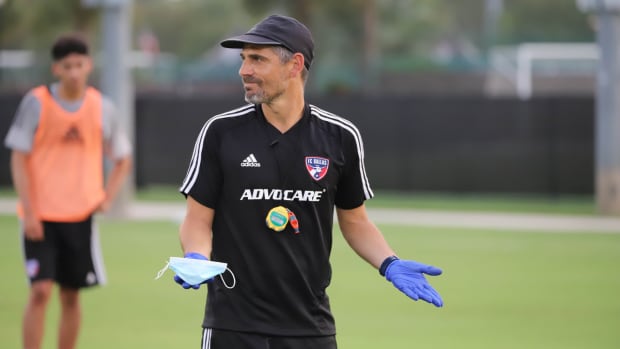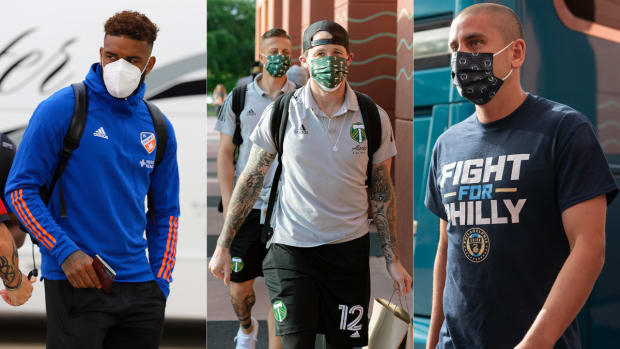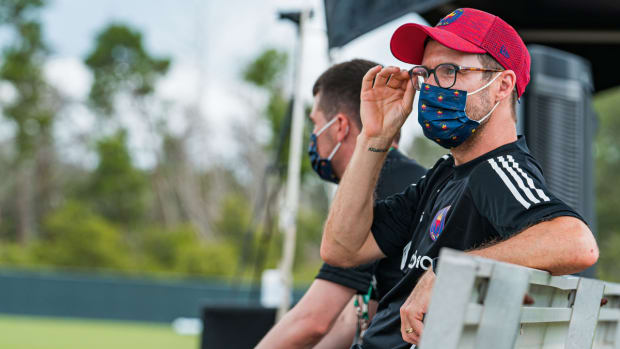One club has already had to withdraw and matches have had to be postponed before the opening kick. Will the soccer in MLS's return-to-play tournament eventually overtake the concern surrounding it?
The thing about bubbles is that they’re fragile. It doesn’t take much—a bit of breeze, a subtle change in surface tension—to burst one.
Before the pandemic, the most common use of “bubble” in a sports context was to describe the precarious status of college basketball teams hoping to make the NCAA tournament. Those on the at-large fringes were “on the bubble”—meaning it could burst at any time, taking their postseason hopes with it. It’s a metaphor for fragility.
Now “the bubble” has become the place where MLS hope to resume its 2020 seasons (not to mention the NHL, NBA and NWSL, which is already underway). But this bubble needs to be strong, and as Wednesday night’s kickoff of the MLS Is Back Tournament approaches, there are significant questions and concerns in central Florida. Will the bubble hold up? Was it even a good idea? Maybe they should’ve called it the “MLS Bunker” or the “Orlando Death Star.” But in the end, that would’ve been false advertising. After months of planning, the entire event inside the bubble seems to be on the bubble.
One team, FC Dallas, is already out, booted by MLS on Monday. Another, Nashville SC, may follow. Games have been postponed before any have been played. The competition format will have to be revised. And yet MLS and commissioner Don Garber are pressing on.
“If there is a situation at any time that I believe that the protocols aren’t working and the health and safety of our players is at risk, then I will make the decision to shut down the tournament,” Garber told the Associated Press after FCD was removed from the tournament. “That is something I committed to the players and to our entire league early on. But this is proving that our protocols worked and our plan so far has been sound.”
And so for now, MLS still intends to be back. Here are the primary storylines as the league hopes the bubble holds and returns to action.

The Tournament’s Status
Until a champion is crowned next month, this is what we’re going to be talking about. The unfolding of events in Florida has been as awkward as the tournament’s name. Even before players and coaches began arriving, MLS had to change the competition format because it messed up the number of clubs advancing from the one six-team group. Since then, flexibility and adaptability have been the order of the day. Thankfully for the league, since this is a standalone event, it can do as it sees fit.
FC Dallas is out, a casualty of positive coronavirus tests from 10 players and one coach. Nashville remains in play for now, but on Tuesday its first tournament game—originally Wednesday against the Chicago Fire—was postponed indefinitely. NSC has had five players test positive, while four more received “inconclusive results.”
“In conjunction with the club, MLS will continue to evaluate Nashville SC’s participation in the MLS is Back Tournament following the results of additional testing,” the league said.
MLS hasn’t announced what it’s going to do about FCD’s departure. There now are three clubs in Group B: Seattle Sounders, Vancouver Whitecaps and San Jose Earthquakes. Each club’s three group-stage games were supposed to count in the 2020 regular season standings (assuming MLS is able to resume its regular season later this summer or fall).
MLS could limit the remaining three Group B clubs to two games apiece and figure out the rest later, or it could move a club from Group A—the six-team group—to B. The problem there, however, is that A comprises Eastern Conference clubs (including Nashville) and B comprises Western Conference clubs. As of Tuesday afternoon, MLS had yet to announce a solution.
Further adjustments could be required as teams that recently have entered the bubble get their test results. Toronto FC’s Monday arrival has already forced its opener, against D.C. United, back by a couple days.
“We feel very strongly that the integrity of the tournament is in place," Garber told ESPN when discussing FCD’s departure. "We knew all along that we're going to have to manage a unique dynamic down in Florida, one in which we'll have to be mindful of having to reschedule games due to weather and other things as they come up.”
Could further adjustments or withdrawals lead to a reconsideration of the regular-season status of first-round matches? That remains to be seen.

The Bubble’s Strength
While Dallas’s removal from the tournament is a sobering development, MLS has insisted that the bubble remains intact. It said Monday evening that FCD accounted for 10 of the 13 positive player tests so far (not including some of the Nashville results announced Tuesday morning). A Columbus Crew player also tested positive.
Every team is now in Orlando, and the success of the tournament now depends on whether MLS can avoid an outbreak inside the bubble. Protocols are strict, but there do appear to be some holes.
One concerns the fact that the coronavirus can be contracted up to a week before it results in a positive test, meaning someone can test negative before they arrive in Orlando but then test positive once inside the bubble. Clubs aren’t quarantining before departure. It’s a potential vulnerability. MLS reportedly believes that all positive patients so far contracted the virus outside the bubble.
Another is the status of hotel and on-site workers who exit and re-enter the bubble. Contact with MLS personnel is supposed to be restricted, but mistakes can happen. There are a ton of variables, as Colorado Rapids forward Diego Rubio explained:
Chicago Fire forward CJ Sapong sent this out, indicating there’s already some tension inside:
Nevertheless, at the moment, the bubble is holding.
Inter Miami’s Rodolfo Pizarro said Monday, “I personally feel safe. I think MLS has taken all the proper protocols, for me personally and the team, to feel safe. And I think what we have to do is make sure we don’t get together and join other groups from other team. We’ve been saying amongst the Inter Miami group and that way we can maintain safety.”
The commissioner believes Pizarro’s experience represents the majority’s.
“Right now it’s an extremely low percentage [of positive tests]. The players that are there are safe,” Garber told ESPN. “They’re comfortable. They’re training. They’re eating. They’re recreating. They’re doing the things in accordance with our protocols. They’re wearing masks. They’re socially distancing. They’re managing their lives in a bubble.”
He continued, “Now if that bubble is suspect and something should happen, then we’re going to have to address that. … In the event that we have an outbreak of the virus amongst our teams, then we’ll make the decision to not go forward with the tournament. But until that time, me and our clubs and the league leadership are very focused on going forward with a very close eye on the safety of the players.”

The Soccer
We’ll find out soon whether the players can shake off their unease, not to mention months of rust, and play some decent soccer. It may take each team a game or two for that to happen, if it happens at all.
Most of the players taking the field at ESPN’s Wide World of Sports complex will probably never have spent so much time away from the game. Apart from the five teams involved in the 2020 Concacaf Champions League, who have a couple extra games under their belt, MLS is Back Tournament participants will have played only two matches (the regular season games in early March) over the past 8-9 months. That’s a massive, practically unprecedented fallow period for high-level players. And they haven’t had anything resembling a second preseason either, as full training has been limited and friendlies were impossible.
MLS is unpredictable as it is. The layoff, the weather, the setting and the absence of any fans or atmosphere will make this tournament even more so.
Who are the favorites? The big (by MLS standards) clubs come to mind, although Los Angeles FC (Carlos Vela, who’s sitting out to remain with his pregnant wife) and Atlanta United (Josef Martínez, who’s injured) are missing their post prolific attackers. Last year’s MLS Cup finalists, the Seattle Sounders and Toronto FC, are tournament-tested teams. But a surprise winner won’t be one, as the short format (seven games for the two finalists) and almost limitless number of variables could play havoc on the results.
As only the group-stage games count toward an eventual regular season, the commitment of advancing teams to stick it out inside the bubble for up to four more matches will be fascinating to monitor. Is a relatively meaningless title, a small portion of a $1.1 million prize pool and a spot in the 2021 CCL worth additional weeks in isolation? The knockout rounds of the tournament could devolve into something resembling the 2005 South Park episode “The Losing Edge,” in which little leaguers did everything they could to lose playoff games so they could resume the fun portion of their summers.
“Look, we’re going to be losers tonight, all right?”
“I don’t think so. There’s no way you can lose to us. We’re doing down. We’re going to get creamed!”
Vela is the biggest name sitting out, although he’s not the only one. MLS Defender of the Year Ike Opara from Minnesota United will miss at least the group stage while continuing "physical rehabilitation on a preexisting condition," while LA Galaxy midfielder Jonathan Dos Santos is out altogether after hernia surgery. Vancouver’s Fredy Montero and Lucas Cavallini are among the Whitecaps who won’t be in Orlando (Vancouver was the only team to reveal its active roster as of Tuesday afternoon), and Real Salt Lake defender Nedum Onuoha also opted out.
It’ll be interesting to see what several high-profile new coaches of underachieving clubs might get out of their players over the course of the next month. For some teams and managers, winning in Orlando might represent the first step toward establishing a successful culture. Among those coaches to watch are Thierry Henry (Montreal), Tab Ramos (Houston), Robin Fraser (Colorado), Raphaël Wicky (Chicago), Jaap Stam (Cincinnati) and Óscar Pareja (Orlando).
The tournament’s round of 16 runs July 25-28, and the knockout stage continues through to the final on Aug. 11.